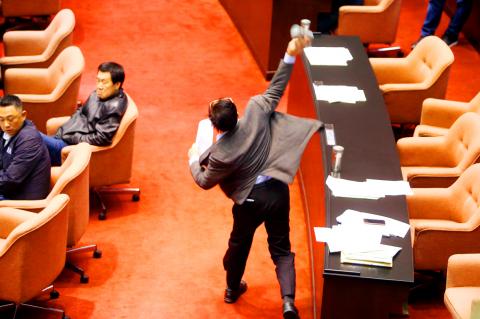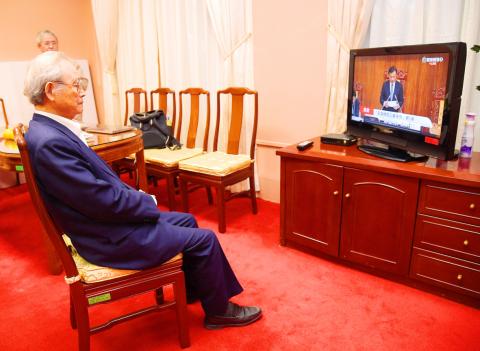The Act on Promoting Transitional Justice (促進轉型正義條例), which aims to remove authoritarian-era symbols and retry cases of injustice from that era, was passed by the Legislative Yuan yesterday evening.
The act is aimed at addressing injustices perpetrated by then-Chinese Nationalist Party (KMT) government between Aug. 15, 1945, when the Japanese government announced it had surrendered, to Nov. 6, 1992, when the Period of National Mobilization against Communist Rebellion ended in Kinmen and Lienchiang counties.
A nine-member Transitional Justice Promotion Committee is to be created, to be overseen by the Executive Yuan, with its chairman nominated by the premier and approved by at least half of the members of the Legislative Yuan.

Photo: CNA
The committee is also to address and utilize ill-gotten political party assets, but its purview will not include items already covered by the Act Governing the Handling of Ill-gotten Properties by Political Parties and Their Affiliate Organizations (政黨及其附隨組織不當取得財產處理).
The new act states that data unconstitutionally seized during the authoritarian era are to be collated and archived and made available for research and educational purposes as long as people mentioned in the data have their privacy and their freedom of communication protected.
Authoritarian symbols commemorating dictators that are publicly displayed are to be removed, renamed or addressed by other means as a way of upholding the nation’s free and democratic constitutional system.

Photo: Huang Yao-cheng, Taipei Times
Criminal cases found to have been unjustly adjudicated on are to be reinvestigated by the committee, with defendants granted retrial. People found responsible for mistrials are to be held accountable and required to compensate defendants and their family members as well as to take measures to restore their reputations.
Political parties, their affiliates and organizations they operate are to report to the committee any political files in their possession which, if necessary, are to be transferred to the government and archived.
Those that fail to do so could be fined between NT$1 million and NT$5 million (US$33,341 and US$166,705) and could be subject to repeated fines.
People found guilty of disposing of, sabotaging or concealing political data owned by political parties or their affiliated organizations could face prison sentences of up to five years.
People who object to rulings by the committee would have one month to request a reinvestigation and two months to initiate an administrative lawsuit.
Chinese Nationalist Party (KMT) lawmakers said the Democratic Progressive Party (DPP) has undermined the nation’s political system by creating an agency with administrative, judicial and investigative powers.
The passage of the act heralds the dawning of a new authoritarian era, KMT Legislator Lai Shyh-bao (賴士葆) said.
The act clearly targets the KMT and overlooks atrocities perpetrated by the Japanese colonial government, he said.
“When the KMT regains political power, we will also propose a transitional justice bill targeting [President] Tsai’s [Ing-wen, 蔡英文] authoritarian rule,” he said.
Non-Partisan Solidarity Union Legislator May Chin (高金素梅) and New Power Party Legislator Kawlo Iyun Pacidal panned the act for not requiring the government to relinquish Aboriginal lands once held by the Japanese colonial government.
However, DPP Legislator Wang Ding-yu (王定宇) said the act “opened a new frontier” for victims of the authoritarian era, as the government can now legally investigate data from that period, seek out and punish perpetrators of injustice as well as compensate the era’s victims and restore their dignity.
This story has been updated since it was first published.

NO HUMAN ERROR: After the incident, the Coast Guard Administration said it would obtain uncrewed aerial vehicles and vessels to boost its detection capacity Authorities would improve border control to prevent unlawful entry into Taiwan’s waters and safeguard national security, the Mainland Affairs Council (MAC) said yesterday after a Chinese man reached the nation’s coast on an inflatable boat, saying he “defected to freedom.” The man was found on a rubber boat when he was about to set foot on Taiwan at the estuary of Houkeng River (後坑溪) near Taiping Borough (太平) in New Taipei City’s Linkou District (林口), authorities said. The Coast Guard Administration’s (CGA) northern branch said it received a report at 6:30am yesterday morning from the New Taipei City Fire Department about a

IN BEIJING’S FAVOR: A China Coast Guard spokesperson said that the Chinese maritime police would continue to carry out law enforcement activities in waters it claims The Philippines withdrew its coast guard vessel from a South China Sea shoal that has recently been at the center of tensions with Beijing. BRP Teresa Magbanua “was compelled to return to port” from Sabina Shoal (Xianbin Shoal, 仙濱暗沙) due to bad weather, depleted supplies and the need to evacuate personnel requiring medical care, the Philippine Coast Guard (PCG) spokesman Jay Tarriela said yesterday in a post on X. The Philippine vessel “will be in tiptop shape to resume her mission” after it has been resupplied and repaired, Philippine Executive Secretary Lucas Bersamin, who heads the nation’s maritime council, said

REGIONAL STABILITY: Taipei thanked the Biden administration for authorizing its 16th sale of military goods and services to uphold Taiwan’s defense and safety The US Department of State has approved the sale of US$228 million of military goods and services to Taiwan, the US Department of Defense said on Monday. The state department “made a determination approving a possible Foreign Military Sale” to the Taipei Economic and Cultural Representative Office in the US for “return, repair and reshipment of spare parts and related equipment,” the defense department’s Defense Security Cooperation Agency said in a news release. Taiwan had requested the purchase of items and services which include the “return, repair and reshipment of classified and unclassified spare parts for aircraft and related equipment; US Government

More than 500 people on Saturday marched in New York in support of Taiwan’s entry to the UN, significantly more people than previous years. The march, coinciding with the ongoing 79th session of the UN General Assembly, comes close on the heels of growing international discourse regarding the meaning of UN Resolution 2758. Resolution 2758, adopted by the UN General Assembly in 1971, recognizes the People’s Republic of China (PRC) as the “only lawful representative of China.” It resulted in the Republic of China (ROC) losing its seat at the UN to the PRC. Taiwan has since been excluded from